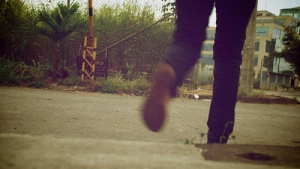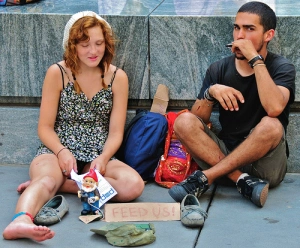
Gemma ran away from home at only 15, having too many troubles with her parents. After she had been rejected from school because she was found smoking cannabis, she started to steal money to her violent father to fund her addiction and was too scared to admit it. A friend’s sofa was better than lies and argues, she thought. But later on, she was led to face her problems and unexpectedly things turned better.
Hundreds of youths like her are welcomed every day in the centres of Depaul, a non-profit organization dedicated to helping homeless people aged between 16 and 24.
Mr Paul Benson, fundraiser of the charity, has seen a lot of these stories and is more determined than ever to find as much money as he can to support the volunteers’ activity.
The budget is never enough when your goal is to “protect young people by finding them a place to call home” and “provide them with the chance to fulfil their potential”.
“Our daily challenge is to give disadvantaged youths the opportunity to change their lives substantially and support them in this process,” he said.
“It’s hard because they all have very chaotic backgrounds, including huge financial problems, drug or alcohol addictions, and in some cases even violence.”
Gemma, a 19 years-old girl from Kent, came in contact with the Depaul centre in Kent thanks to her new school. “It’s very useful to collaborate with high schools. They send us the most vulnerable pupils, so that we can intervene at an earlier stage and have better results,” Mr Benson added.
Other ways to accede to one of the centres are through social services, local councils, housing programmes and youth offending teams. There are 18 accommodations across the UK – both for short and long term – and 45 emergency night-stops, which are set in volunteers’ homes.
Once the guys have a place to sleep, the charity introduces them to different programs such as psychological help, alcohol rehabilitation and mentoring. “We want to stop the homelessness cycle and to do this, we need to work on all those issues,” said Mr Benson firmly.
“In the majority of the cases, young people became homeless because they broke up with their families,” told me Mr Benson. “That’s why the ‘Family Reconnect’ project is so important.” Every youth can attend sessions with a personal assistant, who gives him advice according to his individual situation and tries to establish a contact with the family.
“Working individually, we are able to mediate each relationship accurately, bringing the two sides together until the child moves back home or at some relatives’ house.”
Volunteer Rosie, a 42 years-old woman from Kent, helped Gemma to manage her anger, build up her self-esteem and counselled her on how to take her responsibilities. They also discussed the effects of cannabis use, and the girl decided to attend a drug-counselling program as well.
The girl made big progress and eventually felt strong enough to move back home, where she tried to apply what she had learnt in her one-to-one sessions with Rosie. Initially, mum and dad didn’t accept the mediation, but as she didn’t give up, they slowly began to listen to her worries and changed behaviour.
“Parents are usually reluctant at first: they just don’t want to hear anything about us. Of course, it takes a while to get in touch and re-build the trust,” said Mr Benson, “but when they see the results on their child’s behaviour, they take it positively.”
More than half of the people engaged with the project, especially the youngest, move back with their families, while a 35% re-establish a contact with them, which would improve on the long term.
“Although youths over-18 prefer to look for an accommodation on their own, we think it’s still important for them to get a sort of dialogue with the family and find out why they came to this crisis,” said Mr Benson. “If they don’t solve those problems, it is very likely that the same story would repeat when they will have children. We have to break the cycle.”

Around 75,000 young people in the UK become homeless every year and the number is growing. According to the latest report of Statutory Homelessness – the data refer to the period between July and September 2010 – the rate of youths in the streets is on the increase again for the first time since 2003 and also unemployment is at an all time high.
“With the financial crisis and the cuts to the public sector, we have to focus even more on prevention,” he said, truly concerned.
But finding an accommodation and talking again with parents is not enough for a long-lasting change: former roofless need to think seriously about what they want to do in their lives and start cultivating their future.
“Besides motivating the guys to fulfil their potential, volunteers help them with simple things like writing a CV, paying bills, searching a job and improve their skills.” Now they must find their way and become independent.
Some 23 or 24-years-old former homeless also attend the “Employability Program”, which for most of them is the first working experience ever. They are taught how to do a job and to respect the rules and times given by the employer.
“Having the chance to help the community somehow, they usually like it and decide to look for a job or attend some higher level courses into other charities.”
They often discover new interests and get a huge variety of employments, from carpenter to electrician, from industrial designer to sound engineer. “A boy of 17 is now working full-time for the railway company, while an 18-years-old guy is working in the Somerset House Museum in Waterloo and another one decided to go to college and became a lawyer.”
“They only need our support to start. Once they begin to shape their lives, our job is almost finished.”
In a dozen years, Paul might receive an email from Gemma, at that time happily married with children, a nice flat and a job. Thankful for what the charity has done for her, she would offer her experience to help other unfortunate youths, becoming one of the most committed volunteers of Depaul.